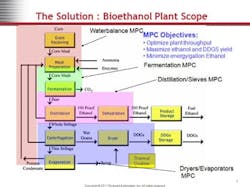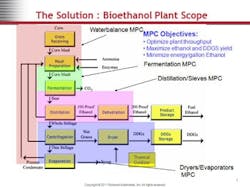Ethanol Plant Boosts Operating Margin
Imagine that you run a multi-million-dollar bio-ethanol production plant. You have an excellent plant design, experienced staff, and want to operate your plant for the long term. However, you must contend with a highly volatile market due to swings in corn costs and ethanol prices. This is the situation Cardinal Ethanol faced after starting up its plant in 2008.
The $168-million facility in Union City, Ind., which has a staff of 49, annually processes more than 36 million bushels of locally grown corn to produce 100 million gallons of ethanol and 320,000 tons of dry distillers grain and solubles (DDGS).
Formed by local farmers and investors, the company set four clear goals from the start:
1. Maximize value through strategic and efficient plant operations.
2. Improve productivity with best-in-class technologies.
3. Optimize production margin.
4. Fuel America's economic development.
THE CHALLENGE
Within the first nine months of operation, Cardinal Ethanol ramped-up production to nameplate capacity. However, just as the plant reached its production targets, the economic downturn of 2008 occurred, causing margins to become razor-thin. To survive, the facility had to increase its operating margin.
Because all processes — milling, fermentation, distillation, drying, etc. (Figure 1) — were integrated by energy or material flow, finding a way to optimize the process and maximize operating margin proved difficult. While existing proportional-integral-derivative (PID) controller strategies automated individual portions of the plant, these simplified controls didn't capture all interactions across the plant that could be optimized.
So, even with well-trained operators, accurate laboratory measurements and best-in-class PID controls, variations in key plant parameters were too high, resulting in inconsistent production. Cardinal Ethanol needed to capture, analyze and control all parts of the plant under a single, unified model.
The company turned to Pavilion8-based model predictive control (MPC) technology from Rockwell Automation to stabilize and drive peak efficiency across the entire plant. The system can be built and added as a supervisory control system without modifying existing process equipment. Moreover, this technology has proven itself in more than 30 ethanol plants, producing significant margin gains in each facility.
THE SOLUTION
To install the Pavilion8-based MPC solution, Rockwell Automation application engineers came on-site in December 2009 to build nonlinear dynamic response models and Soft Sensor models based on plant tests and historical data. Soft Sensor models give inferential values that replace laboratory measurements; these then are integrated into the solution to provide continuous control of key laboratory measurements. The models were developed for properties such as slurry solids, fermenter high-performance-liquid-chromatography data, and syrup solids.
The Milling and Slurry Control application reduced feed quality variation and helped the plant safely run at mill amperage limits without tripping the hammermills. It also helped ensure consistent quality slurry, improving batch fermentation performance. In addition, the application, which is linked to the distillation sieves and the dryer/evaporator process units, anticipated constraints and thus enabled operating at higher energy efficiency and capacity.
The Batch Fermentation Control application adjusted temperature conditions and helped ensure an optimal dynamic ratio of enzyme to feedstock and the best trajectories to respond to changes in feedstock quality. This led to a cut of more than 40% in the average of residual sugars and a drop in excess of 70% in the standard deviation. A higher conversion of starch to ethanol yielded more ethanol for the same amount of corn, the key factor in the overall margin increase.
The MPC technology identified energy inefficiencies in separating and purifying ethanol. Optimizing energy trade-offs between the sieve and distillation operations allowed the Distillation and Dehydration Control application to reduce energy use variability by more than 50%.
The Dryer and Evaporator application, which controls evaporator solids and dryer moisture while managing stillage inventory and syrup usage, improved both DDGS quality and yield, and minimized energy use.
THE BENEFITS
Since its installation was completed in February 2011, the Pavilion8-based MPC solution has greatly improved overall plant stability and reduced variability of all crucial process parameters — especially in the batch fermentation operations. Key gains include:
• 2.2% increase in ethanol yield per bushel of corn;
• 7.2% boost in overall ethanol production;
• 7.7% decrease in energy consumption per gallon;
• better stability of all key process variables;
• 40–70% reduction in the standard deviation for each variable, and
• payback of less than 12 months.
In addition, it has achieved operator acceptance.
Overall, the project exceeded the expectations of Cardinal Ethanol. Due to its success, the company contracted with Rockwell Automation for sustained solution support. This will enable incorporating minor plant-configuration changes into the optimization solution. Today, the service factor of the system exceeds 99% for all variables. The significant increase in operating margin has helped ensure that Cardinal Ethanol is a well-positioned, low-cost producer. In addition, the optimization has cut its carbon footprint to below the industry average.
MAINA MACHARIA is Austin, Texas-based biofuels industry manager for Rockwell Automation. E-mail him at [email protected].

